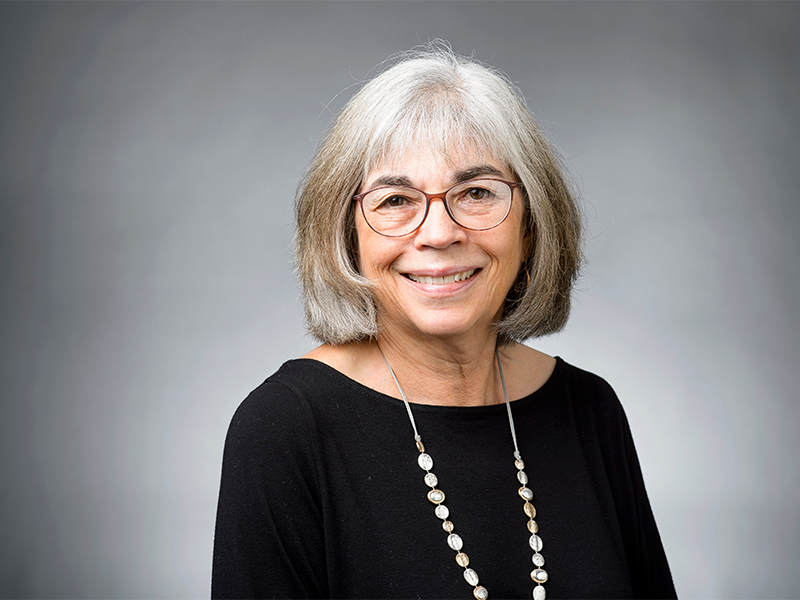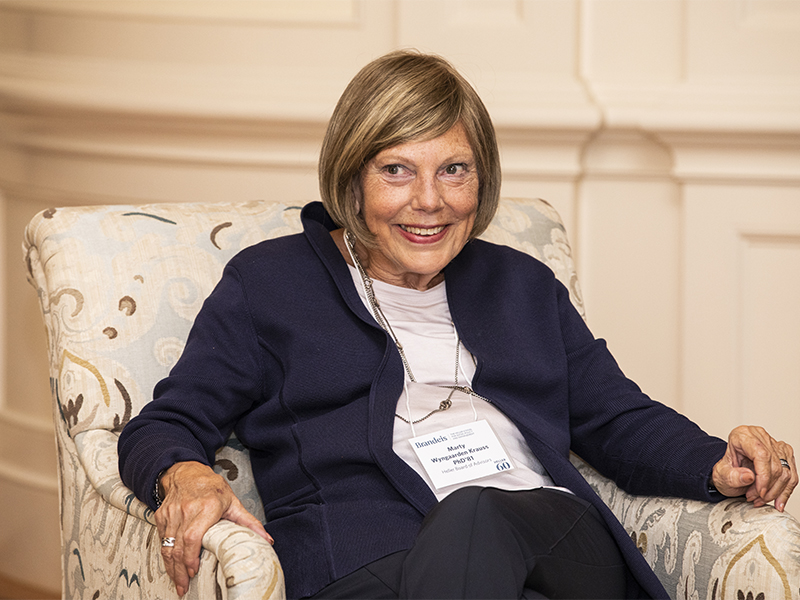
Marsha Mailick, PhD’78, is one of 15 alumni to receive a 2020 Florence G. Heller Alumni Award. She is Emeritus Vice Chancellor for Research and Graduate Education at the University of Wisconsin-Madison and is an expert in developmental disabilities across the lifespan, including the long-term impacts on families and caregivers.
Mailick was interviewed by former Interim Dean Marty Krauss, PhD’81, who also nominated her for the award. Mailick and Krauss were classmates in the PhD program at Heller, where they became friends and longtime research collaborators on a number of projects focused on individuals with developmental disabilities and their families.

Marty Krauss: Let’s start at the beginning. What brought you to the Heller School?
Marsha Mailick: So, the bottom line is that it was the reputation. When I was an undergraduate, I became very interested in understanding services for people with developmental disabilities and the impact on families. Fortunately, the Heller School was known to have a focus on developmental disabilities and advocacy and public policy, and it was right down the Mass Pike from where I was living.
The Heller School being an interdisciplinary graduate training program really fit who I was when I entered graduate school. I never really was in the middle of one discipline, but rather across disciplines and the Heller School broadened that even further. I think that allowed me to ask more innovative questions.
MK: Are there specific memories that stand out to you about your time at the Heller School that you remember with great fondness?
MM: The most significant outcome of my experience at the Heller School was collaborating with you, Marty. I remember the first time you and I went to a conference together, in Minneapolis. I remember we realized that we had very similar interests, and you invited me to collaborate with you. We published some papers together and then we just decided to join forces and work together. That was one of the most significant decisions of my life.
MK: And mine! What would you say to current students on what they should be looking to take away from their time at Heller?
MM: Look to your left and look to your right in class. Talk to your fellow students because you may find a collaborator who is as important to you as Marty Krauss has been to me, or multiple collaborators if you're really fortunate. The students have as much to offer each other as the faculty, and you're going to move through your careers together. In time, it may be that those lateral connections will be as important as your faculty mentors.
MK: What is your proudest career accomplishment?
MM: The highest career achievement that I had was serving as Vice Chancellor for Research and Graduate Education at the University of Wisconsin, which has been for many decades among the top five research institutions based on federal expenditures. It was a huge job and was really very interesting, but I wouldn't say that it’s my proudest career accomplishment.
My proudest career accomplishment was serving as Director of the Waisman Center at the University of Wisconsin, which I did for 12 years. It’s an interdisciplinary research training and clinical services center with faculty from across 40 different departments on campus. Faculty come together focused on neurodevelopmental disorders and neurodegenerative diseases from an educational perspective, a social science perspective, a biological perspective and a public policy perspective.
Serving as director of the Waisman Center was like another opportunity for graduate education. I learned an enormous amount. Not being within a discipline gave me some credibility for thinking across disciplines with my colleagues who were from so many different schools and colleges on campus. It did occur to me that the Heller School was the perfect kind of background for this opportunity.
I had to overcome some biases among my medical school and biological science colleagues who were wondering what a woman social scientist would be doing directing the Waisman Center. They came in with prejudices that I had to overcome. But I have to say that I worked at overcoming them and they faded away.
MK: Can you say a little bit more about how the work you’re doing today connects to the current COVID-19 crisis, or to other scientific challenges, such as climate change?
MM: Given this terrible time that we’re living in, I can’t help but reflect about how my work is in some ways relevant to the pandemic and to the economic recession that we are all struggling with right now.
You and I worked together on several longitudinal research studies focused on families of adults or adolescents with developmental disabilities. We studied 406 families of individuals on the autism spectrum from age 10 to into their 40s. We've been studying this cohort ever since and we have published over 50 papers. We’ve have had a really big impact on defining the impact of lifelong, atypical parenting responsibilities. Together, we’ve documented the resilience of these families as well as their vulnerabilities.
We studied these families through the Great Recession of 2008 and we learned that these families were more negatively affected by the downturn than families who did not have children with disabilities. They had less of a safety net and they had more demands on them to provide a good life for their son or daughter with disabilities. We also saw that keeping a job for people with autism is really hard.
We're about to go back into the field and interview these families again and look at what has happened to them during the COVID-19 pandemic. Did their son or daughter who was in the workplace lose their job? Did the parent lose their job? How did they have to reconfigure their lives to make sure that they can optimize the development and quality of life of their son or daughter?
We all think about the vulnerable populations in the pandemic: the frontline health care workers, the service workers, those who keep our economy going. But there are other vulnerable populations such as families of people with developmental disabilities. And in that sense, my current work is helping us understand how the pandemic and current recession uniquely impact them.
MK: That's a very challenging situation for a very hidden group of individuals and families, that was largely unarticulated even 20 years ago. It relates to social justice, which Brandeis and Heller are all about.
MM: Yes, we often talk about social justice with respect to the criminal justice system and police reform, especially today, but there's also justice in terms of family policy. These families need stronger social support and formal support services. Our public policy safety net for these families is not strong enough and it will be strained further over these next months; families are at home, they may be in dire financial constraints, they are living in close quarters in a way that none of us have ever really done, and they are particularly challenged.
MK: What projects are you working on at this stage in your life?
MM: I find myself working almost full time right now, even though I no longer have a “job-job,” which I'm thrilled about. I'm involved in three or four NIH grants that are taking up a lot of time. I think that the downside of working from home is there's never an end. On the other hand, I am, totally engrossed in my research, I love it and it feels like an endless sabbatical more than anything else.
MK: Well, we've had a wonderful ride, haven’t we? Marsha, it has been great talking to you. You've had a very illustrious career and we count you among our very best.
MM: You're very kind.
